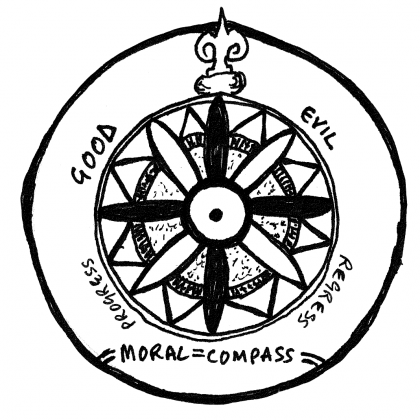Staring Down History
Kate Whittaker Cousino | Jan 27, 2017 | 1 cmt
![By Creator:Sebastian C. Adams [Public domain], via Wikimedia Commons](../../images/uploads/blog_entry_images/History.jpg)
Image Creator:Sebastian C. Adams [Public domain], via Wikimedia Commons
It's popular in some circles to advise people to ask themselves, "Am I on the right side of history?" The idea is to look at contemporary issues from a distance and ask yourself what a theoretical future person would think of the issues of our day.
I'm not sure, however, how useful it is. We are very good at imagining that future generations will think like we do--we certainly project contemporary values on the past all the time in our entertainment.
More problematically, the question assumes that the future observer is ethically advanced, that the progress of history has brought humanity closer to some future state of equality, enlightenment, and justice.
It's easy enough to chart the progress of certain ideas currently in vogue and predict the victory of certain social movements, and think that since those ideas seem to be moving towards dominance that they must then be better. After all, we don't want to be on the wrong side of history! It helps to remember that the judgment of history is merely the judgment of those who prevail, and there is no reason to believe the just will always prevail on earth.
In other circles, where the myth of progress is violently eschewed, there is a temptation to instead enshrine the past as representing some kind of golden age, a time when truth was truth and we knew where we stood. Maybe there were some things that weren't perfect, but we are assured that overall, human life was much more natural, organic, or virtuous. We have to learn from the wisdom of the past before it is lost! We need to go back to a better time! But it was the times that were that brought us to the time that is. The seeds of whatever rot we are reaping now were all sown in centuries past; there is no perfect age to go back to. And the past contains things that seem now self-evidently evil, such that we find ourselves having to amend some serious provisos to our dreams of travelling backwards in time.
Perhaps then, we should not waste time trying to find "the right side of history" and instead dedicate ourselves to being humbled by it. Looking back, we can see what seem like glaring hypocrisies--advocates of the "Inalienable Right to Liberty" who owned slaves, Christian missionaries who mistreated their charges--so many blind spots in people who failed to live up to their professed ideals in a consistent manner.
We are not any different from the people of the past. Those of the future are not any different than we are. We are all inclined to blind spots, to inconsistencies, to hypocrisy, to confusion. We might accept the platitudes of today without examination, or accept the platitudes of the past with just as little thought. The desire to be "on the right side of history" is only the process of accepting what we imagine to be the platitudes of the future, without examining the direction we are heading. 
It was suggested to me, during a discussion earlier this week, that it is unrealistic, heartless, and privileged to attempt to apply a set of ethical and moral principles to the real situations people and nations face. Times of crisis, I was told, are no time for "intellectual games," no time for examining the morality of acts, no time for asking questions about what makes X an evil but Y tolerable.
It seems to me, though, that the only time we do have to put our principles into action is the time we are in. Now is the time to become actors in history, moved not by the currents around us but by the compass of our principles. There will never be a better time to find your compass and set your path by it than the day you are in now. It is the only time you have.

Comments (1)
Katie van Schaijik
Jan 30, 2017 2:09pm
You bring to mind a discussion I got into on Facebook not long ago. (I think you were there, Kate.) It had to do with whether the question "What would a reasonable Christian do in this situation?" is a good and useful one for individual conscientious discernment.
I think it isn't. I think individual moral discernment in the concrete always ought to be personal. "What should I do in these circumstances?"
The same holds, I think, on broad social and political questions. Not "What will history say," but what do we say, here and now? Where will we take our stand? What seems right to us?